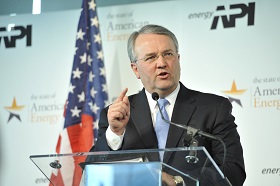The U.S. oil industry seems to be on the verge of the most significant turning point it has faced since the 1970s, when the export of hydrocarbons was banned by the 1975 Energy Policy and Conservation Act signed by President Gerald Ford. But now the ban is questioned by a powerful advocacy group officially established in Washington by industry leaders such as Exxon Mobil, Conoco Phillips, Chevron, PBF Holding co., Shell Oil Co., and Tesoro Corp. They have joined together with other majors and are guided by the American Petroleum Institute and its CEO Jack Gerard, who is regarded by many as the chief architect of the U.S. energy strategy.
The U.S. oil industry seems to be on the verge of the most significant turning point it has faced since the 1970s, when the export of hydrocarbons was banned by the 1975 Energy Policy and Conservation Act signed by President Gerald Ford, in what was to an extent an attempt protect the U.S. from the volatile global market and whimsical global exporters. But now the ban is questioned by a powerful advocacy group officially established in Washington by industry leaders such as Exxon Mobil, Conoco Phillips, Chevron, PBF Holding co., Shell Oil Co., and Tesoro Corp. They have joined together with other majors and are guided by the American Petroleum Institute and its CEO Jack Gerard, who is regarded by many as the chief architect of the U.S. energy strategy.
In a nutshell, the emerging strategy suggests that the United States is set to become a full-fledged actor in the energy market: more openly and forcefully participating across all market segments. Thanks to the shale revolution and vigorous development of Alaskan oil, the U.S.A. has outdone Russia and Saudi Arabia to rise to the status of the world's largest oil producer. Hence, the U.S. domestic market is now too limited to maintain production levels: the resulting glut involves overflowing storage facilities, no growth and canned projects.
According to the hydrocarbon corporations and allied politicians, the time has come for the United States to review its role on the global energy scene by shedding this strict limitations imposed on the producers. The proponents of this move envision the long-term growth in demand primarily in the Asia-Pacific region, which is steadily morphing into the new motor of the global economy. Their other point refers to strong sentiments in Europe about cutting energy dependence on Russia, which makes the Old World a major possible recipient of U.S. oil and gas. Rapprochement along these lines could build a central pillar for integration of the U.S. and European economies, an idea supported by many across the Atlantic. In the long run, this energy strategy is presented as part of a new scheme of world trade robustly advanced by the Obama administration and vividly reflected by its projects under both trans-Atlantic and trans-Pacific partnerships.
The U.S. establishment has varied its approach to repealing the Energy Policy and Conservation Act. From the 1980s to 2000s, oil lobbyists probed ways to amend the law, with local successes reached under Ronald Reagan, Bill Clinton and George Bush Jr., who allowed certain firms to export separate oil grades in a manner that was in line with national interests and avoided any direct breach of the legislation. Steps to lift the sector-wide restrictions began only in 2012 with the arrival of high oil prices and shale extraction technologies, spawning a new vision of the U.S. role in the global energy market. And in December 2014, Joe Barton, a Texan congressman, introduced a bill cancelling the U.S. oil export ban, in what was the first coordinated inroad aimed at reversing the situation.
Although it enjoys potent economic and political support, the new energy strategy also has opponents, first - those who do not want to see the United States openly operating in the volatile oil market as it might yield greater dependence on energy price fluctuations, imported oil on the U.S. domestic market and possibly even greater involvement in regional conflicts. The energy policy act was meant to provide the U.S. with a stable sovereign energy system and imbed the environment protection norms to make the fuel standards more environmentally friendly. The act has given a push to the refining industry, which is worth about USD 700 billion, made the automobile sector much more lucrative and reduced the expenses of key air carriers: the three industries that have united to lobby the inviolability of the act. They insist that repealing the law would threaten national security and threaten the future of the Strategic Petroleum Reserve, i.e. the system of storage created in 1977 and operable until 2025. The network is a key part of the energy security strategy formulated under President Truman and is intended to create a domestic fuel infrastructure protected from foreign interference. Proponents of the export ban fear that the storage facilities will be used as platforms for oil exports, while stores themselves become more susceptible to market fluctuations and foreign interests. Besides, a lot of people oppose the revision of the environmental standards that would inevitably follow legislative changes lobbied by the oil corporations.
This opposition notwithstanding, the abolition of the energy policy act appears more possible than ever before, since the idea is gaining ground both in the Republican Congress and the White House. Ever more targeted policy papers are emerging from key think tanks like Brookings and Cato, and NGOs are mushrooming to influence the media and the public.
Should the lobbyists win, the global energy market and the entire network of trade links are in for major changes. Expect the weakening of an emasculated OPEC and more competition for individual energy giants, i.e. Russia, Saudi Arabia, Iran, Nigeria and others, who will face much fiercer competition in the emerging markets and Europe. At the same time, it is too early to predict the outcome, as the issue is so multifaceted and so many different groups of interests are engaged in the process.






